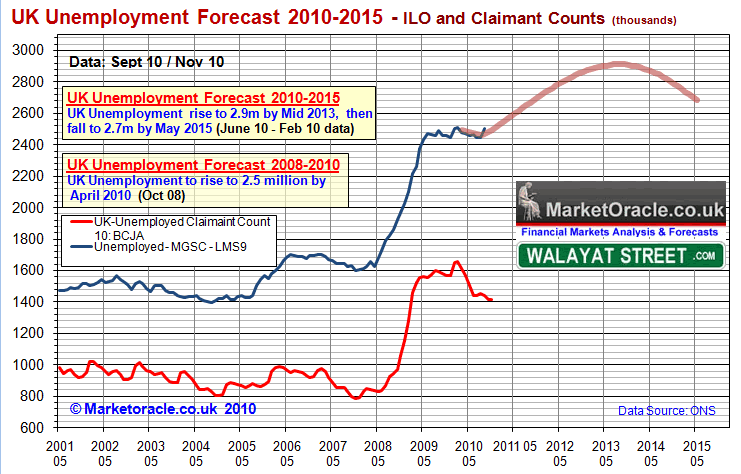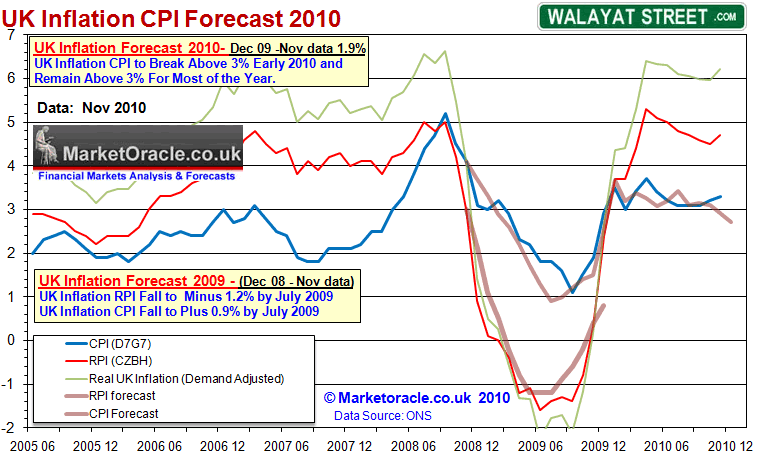Results 1 to 1 of 1
Thread Information
Users Browsing this Thread
There are currently 1 users browsing this thread. (0 members and 1 guests)
-
12-16-2010, 05:25 PM #1Senior Member


- Join Date
- May 2007
- Location
- South West Florida (Behind friendly lines but still in Occupied Territory)
- Posts
- 117,696
UK Jobless Econ. Recovery Unemployment Hits 2.5 million
Britain's Jobless Economic Recovery as UK Unemployment Hits 2.5 million
Economics / Unemployment Dec 16, 2010 - 12:12 AM
By: Nadeem_Walayat
The latest UK unemployment data caught the mainstream press and academic economists by surprise by showing a rise of 35k to 2.5 million (7.9%) for the three months to September 2010. UK unemployment is particularly hitting young people hard which risks creating a lost generation of increasingly angry youth (19.8% unemployed), as well as 1/2 million jobs expected to be cut from the public sector over the next 2 years, many of whom will find it difficult to adapt to the private sector jobs market.
The fundamental flaw in the governments employment policy and OBR forecast for UK unemployment to hit 2 million by 2015 is the fact is that as many as 80% of the new jobs created by the private sector will go to E.U. migrant workers as identified in the UK unemployment forecast (01 Jul 2010 - UK Unemployment Forecast 2010 to 2015 ). The UK unemployment data is line with the forecast trend for UK unemployment to start rising in September and target a trend to 2.9 million by mid 2013 as illustrated by the below forecast graph.

The ongoing euro-zone debt crisis and resulting economic depressions in PIIGS economies is resulting in a huge number of migrant workers entering the UK workforce from especially Ireland, Greece, Portugal and Spain as identified recently (22 Nov 2010 - Ireland Bailout Consequences for Britain, Portugal Next? Stock Market Correction Over? ). Over 100,000 have migrated from Ireland alone over recent months which is set against total private sector job creations running at an average rate of about 30,000 per month, which illustrates that 80% of the new jobs are not going to be filled by UK unemployed citizens. http://www.marketoracle.co.uk/Article24459.html
The government in part is aiming to address the migrant workers issue by attempting to force those on benefits that can work but chose not to work off of benefits, although most of the measures will not be implemented for several years.
The best response from job hunters to the weight of a rising trend in UK unemployment for several years would be to start thinking outside the box and contemplating self employment / business startups as the coalition government has promised to foster a more business friendly environment by cutting red tape.
Earnings Failing to Keep Pace with Inflation
Meanwhile those that are employed continue to be squeezed by average increasing by just 2.2%, which is well below even the manipulated official inflation CPI measure at 3.3%, and half the rate of the more recognised RPI at 4.7%, which actual real inflation of 6.2% triple average earnings.

Inflation is a stealth tax that is being used by the Government and the Bank of England to a. Reduce the budget deficit (eroding purchasing power), and b. funneling tax payers and savers cash onto the balance sheets of the bailed out banks as savers are in receipt of interest net of tax at half the CPI rate and similarly average workers pay rise is near half the CPI and far below the RPI inflation measure of 4.7%.
Protect Your Wealth
At the end of the day savings/ capital taxes PLUS inflation are a means of taking accumulated wealth from the haves and redistributing to the have not's. Over the long run inflation ensures that those with accumulated wealth will ultimately lose most of it to the state (unless their funds are protected against UK inflation and taxation).
Unfortunately the coalition government has accelerated the trend of stealth theft by withdrawing the National Savings Index Linked Certificates in June, that allowed the people of Britain to at least protect upto £15,000 (per issue) of their life time accumulated savings against RPI. Whilst also declaring a switch in annual indexation from RPI to CPI which means under reporting UK inflation by 1.5% against RPI and 3% against real UK inflation (6.2%).
The Bank of England is going to keep printing money which is a positive for asset prices such as stocks. For investors the strategy remains to invest in inflation wealth protection and growth such as agricultural commodities, gold, silver, metals and mining, TIPS, emerging economies such as China, India, Russia, Chile, Brazil, and developed economies such as Australia and Canada as their appreciating currencies will protect your investments purchasing power in sterling as covered at length in the Inflation Mega-trend ebook (FREE DOWNLOAD).
Comments and Source: http://www.marketoracle.co.uk/Article25039.html
By Nadeem Walayat
http://www.marketoracle.co.uk
http://www.marketoracle.co.uk/Article25039.htmlJoin our efforts to Secure America's Borders and End Illegal Immigration by Joining ALIPAC's E-Mail Alerts network (CLICK HERE)


 LinkBack URL
LinkBack URL About LinkBacks
About LinkBacks




 Reply With Quote
Reply With Quote

Long Beach Declares Public Health Emergency Due to ‘Surprising’...
05-04-2024, 07:58 PM in illegal immigration News Stories & Reports